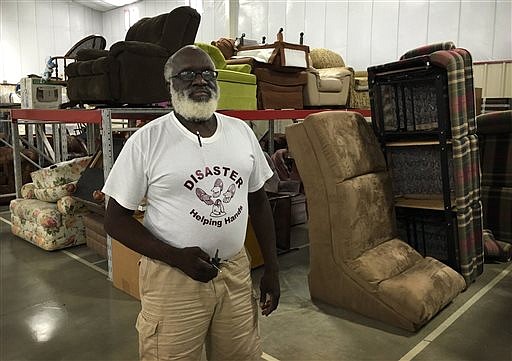WICHITA FALLS, Texas- On Jan. 2, 2006, winds whipped a fast-moving fire across the small ranch town of Ringgold. The fire swallowed 50 homes and scorched tens of thousands of acres of grassland between Ringgold and Nocona to the southeast. Many residents were left homeless with nothing to their name.
When Leon Green heard about the devastation from his home in Wichita Falls, he sprang into action. Green drove to Faith Mission and asked if he could have some of the furniture that had been donated to the homeless shelter. He loaded up his trailer and made eight trips from Wichita Falls to Ringgold with one flatbed trailer.
"That town almost got burned off the map," Green told the Wichita Falls Times Record News. "When I think about it, their entire life changed that day."
People heard about what he was doing and donated items or gave him money to pay for gas.
"I told my wife, there's a need here," he said.
Right after the January fire, Green visited the Nonprofit Management Center and started the process of becoming a full-fledged nonprofit organization. By December, Disaster Helping Hands was officially a 501(c)3.
"I think we're expected to help in church, with tithes and whatever extra we can," Green said. "But we're not limited to help in church. We're also expected to help outside of church. To what degree is up to you."
He started gathering up furniture and other necessities and storing it at various locations around town. In 2015, money was raised to build a large warehouse to store the hundreds of items he had collected. Stacked in the 7,500-square-foot metal building are sofas, refrigerators, chairs, tables, microwaves, fans, mattresses, chests, televisions, VCRs and washing machines.
"I got a load recently when the Econo Lodge closed down near Sheppard Air Force Base," Green said.
He generally does not take clothing, choosing instead to focus on "filling the nooks and crannies of a house."
With his trailer or rented trucks, Green delivers the goods to areas hard hit by natural disasters, from floods to fires and tornadoes to hurricanes. Since 2006, he's been to flood-ravaged areas in Lawton, Kingfisher, Oklahoma, Plaquemine Parish, Louisiana, and here in Wichita Falls. He's traveled to Pine Bluff, Arkansas, and Joplin, Missouri, to help tornado victims. He was in West, Texas, when the people there were reeling from a fertilizer explosion.
Green was all set to take a load to hard-hit Louisiana recently when a fire ripped through an apartment complex near Sheppard Air Force Base. Eight families were displaced.
"We helped take care of their home and got them on their feet," he said. "We take care of people here first."
Before Green is ready to donate items locally through Disaster Helping Hands, he determines if the need is legitimate.
"I make sure they have a case number from the Red Cross," he said. "I'm usually called after Red Cross has set them up in a hotel. The family calls me and I go and assess the needs. Then I come back to the warehouse and start picking out what I have. If there are kids involved, I may grab a VCR and a bigger TV."
For natural disasters in other cities and towns, Green has a strict policy. He loads up a trailer or truck, drives into the affected community and immediately establishes contact with the mayor or someone in charge. He is usually directed to an area with emergency personnel, where he drops off the furniture.
"I may never see the people directly impacted by the donations," Green said. "But that is the best way. I don't know exactly which areas to donate, so I let the people who live there distribute it as needed."
Items have been donated by individuals, businesses, state institutions, families who are downsizing or relocating, and estate settlements. Instead of having items dropped off at the warehouse, Green prefers to pick up the donations.
"I always want to make sure it's usable," he said. "I don't want to deliver anything that doesn't work or is broken. No junk."
Green believes God has blessed him in so many ways and sees his job as simply the middle man.
"It's been pure enjoyment for me," he said. "I'm just helping my brother. I'm just a delivery man."

